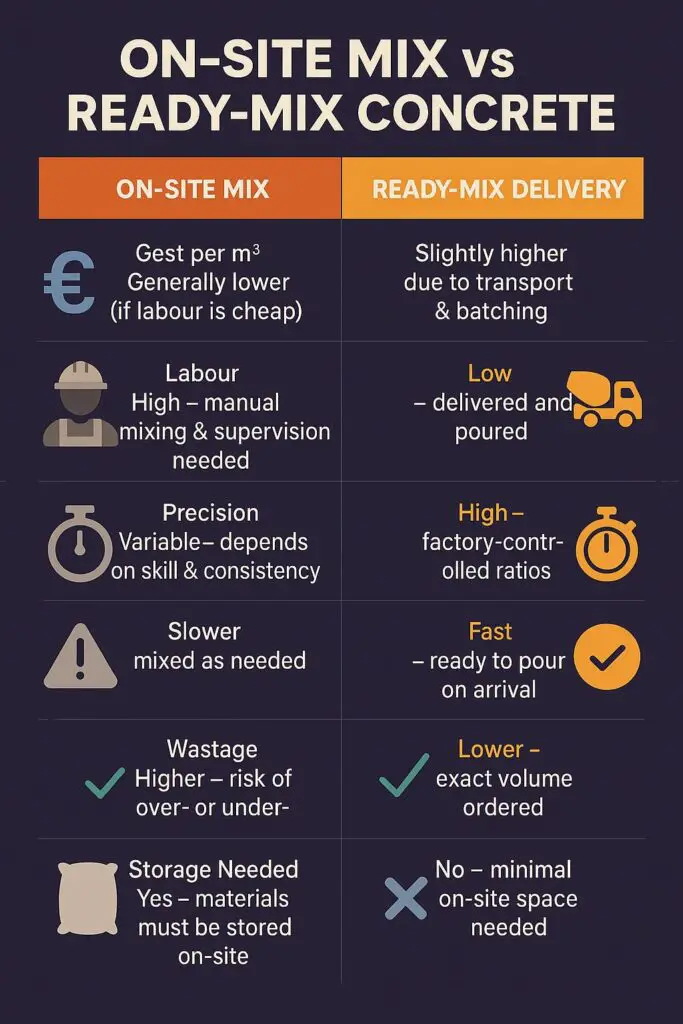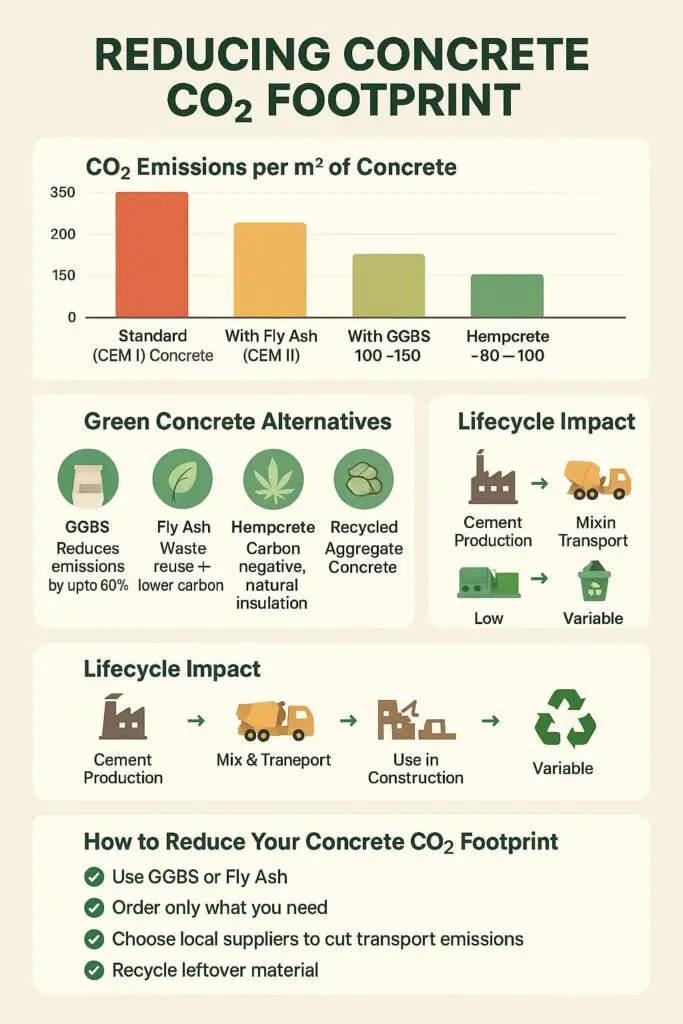Calculate precise concrete volume and cost estimates instantly. Trusted by builders, contractors, and DIY enthusiasts across the UK for accurate project planning and material ordering.
Calculate your concrete requirements in seconds with our advanced tool below. No registration required – completely free to use.
🏗️ Concrete Calculator
From Numbers to Knows – Concrete Clarity in a Click.
📐 Project Details
⚙️ Advanced Options
📊 Complete Results
💡 Professional Tips
Our Other Tools:
- Screed Calculator – Floor Screed Calculation UK
- Self Leveling Concrete Calculator UK
- Cement Ballast Calculator UK – 2025
How to Use Our Concrete Calculator
Select Your Project Type: Choose from six common concrete applications. Each type automatically sets recommended thickness and concrete grade:
- Slab: Driveways, patios, floors (100-150mm typical)
- Footing: Foundation strips, pad foundations (300-600mm)
- Wall: Retaining walls, garden walls (150-300mm)
- Column: Support pillars, fence posts (various sizes)
- Steps: Garden steps, entrance steps (150-200mm treads)
- Circular: Round patios, decorative features (100-150mm)
Measurement Tips:
- Length & Width: Measure the longest and widest points
- Thickness/Depth: Use consistent units - the calculator handles conversions
- Multiple Units: Switch between metres, cm, feet, inches as needed
- Irregular Shapes: Break into sections and calculate separately
Advanced Features Explained
Cost Calculator
Get instant budget estimates with UK market pricing:
Price per m³: Current UK ready-mix prices range £90-£150 per cubic metre depending on grade and location. Our default uses average pricing but you can adjust for local rates.
Delivery Cost: Most UK suppliers charge £60-£100 delivery. Some offer free delivery for orders over 6m³. Enter your quoted delivery cost for accurate totals.
Example Calculation:
- 3m³ concrete at £110/m³ = £330
- Delivery cost = £80
- Total: £410
Waste Calculator (Safety Buffer)
Never run short with proper waste allowance:
5-10% for Professionals: Experienced contractors with good site conditions 10-15% for DIY Projects: First-time concrete pours or complex shapes 15-20% for Difficult Conditions: Poor access, complex reinforcement, or adverse weather
Why Waste Allowance Matters:
- Accounts for spillage during pour
- Covers compaction and settlement
- Provides safety margin for measurement errors
- Prevents costly part-loads and delays
On-Site Mix Calculator
Perfect for smaller projects or remote locations:
Mix Ratios Explained:
- 1:2:4 (General Purpose): Driveways, paths, general construction
- 1:3:6 (Foundations): Mass concrete, strip footings, oversite
- 1:4:8 (Mass Concrete): Large volume pours, non-structural work
- 1:1.5:3 (High Strength): Structural elements, heavy-duty applications
- Custom Ratio: Enter your engineer's specified mix design
On-Site Mix vs Ready-Mix Concrete

Understanding Your Results
Total Volume Required
This is your final concrete requirement including waste allowance. Always order this amount to ensure project completion.
Ready-Mix Concrete
Same as total volume - shows exactly what to order from your concrete supplier. UK suppliers typically deliver in 0.5m³ increments.
25kg Bags Required
For smaller DIY projects mixing by hand or with a small mixer. Each bag covers approximately 0.012m³ when mixed. Popular brands include Blue Circle, Hanson, and Tarmac.
40kg Bags Required
Larger bags offering better value for medium-sized projects. Each bag covers approximately 0.019m³. Ideal for mixer drum capacities of 100-200 litres.
Estimated Weight
Critical for planning delivery access and equipment requirements. Standard concrete weighs 2.4 tonnes per cubic metre. Use this figure to:
- Check vehicle access routes
- Plan lifting equipment needs
- Verify ground bearing capacity
- Calculate labour requirements
Project Specific Guidance
Driveways (Slab Type)
Typical Requirements:
- Thickness: 100mm domestic, 150mm commercial
- Grade: C20/C25 minimum
- Reinforcement: A142 mesh recommended
- Base: 100mm MOT Type 1 hardcore
UK Regulations: Driveways over 5m² using impermeable materials require planning permission unless incorporating sustainable drainage (SuDS).
Foundations (Footing Type)
Building Regulations:
- Minimum 150mm thick for domestic
- Depth varies by ground conditions
- Must extend below frost line (450mm minimum UK)
- Width typically 2.5x wall thickness
Professional Advice Required: Foundation design depends on soil conditions, building load, and local regulations. Always consult a structural engineer for residential foundations.
Garden Walls (Wall Type)
Height Restrictions:
- Under 1m: Generally no restrictions
- 1-2m: May need planning permission near boundaries
- Over 2m: Building regulation approval required
Mix Recommendations: Use C25 grade minimum for structural walls. Include movement joints every 6m for long walls.
Pro Tips for Accurate Calculations
Before You Start:
- Site Survey: Check for underground services using Dial Before You Dig
- Ground Conditions: Soft ground may need extra hardcore base
- Access Planning: Ensure concrete wagons can reach pour location
- Weather Check: Avoid pouring in extreme temperatures
Common Measurement Mistakes:
- Forgetting to account for slopes and gradients
- Mixing metric and imperial measurements
- Not measuring existing surface levels
- Overlooking thickness variations
Money-Saving Tips:
- Bulk Orders: Negotiate better rates for orders over 6m³
- Timing: Winter pours often cost less due to lower demand
- Local Suppliers: Reduce delivery costs with nearest plants
- Pump Hire: Consider concrete pumps for difficult access
When to Use Ready-Mix vs Bags
Ready-Mix Concrete (Recommended for 2m³+)
Advantages: ✓ Consistent quality and strength guaranteed ✓ Faster project completion ✓ Professional mixing ensures correct ratios ✓ Delivered fresh to your site ✓ Various grades available
Current UK Concrete Prices (2025)
| Concrete Type | Price per m³ | Delivery |
|---|---|---|
| C20 Standard | £95-£125 | £60-£100 |
| C25 Standard | £105-£135 | £60-£100 |
| C30 High Strength | £115-£145 | £60-£100 |
| Decorative Mix | £150-£200 | £60-£100 |
Prices vary by location, quantity, and supplier. Use our calculator for localised estimates.
Bagged Concrete (Best for Under 1m³)
When to Choose Bags: ✓ Small repairs and patches ✓ Remote locations without truck access ✓ Projects requiring extended working time ✓ Learning projects and practice pours
Typical Bag Costs:
- 25kg bags: £4-£6 each
- 40kg bags: £6-£9 each
- Bulk discounts available at builders merchants
Essential Equipment Checklist
Hand Tools Required
- Float and Trowel: Finishing and smoothing surfaces
- Spirit Level: Checking levels and gradients
- Rake: Spreading concrete evenly
- Wheelbarrow: Moving concrete from delivery point
- Protective Equipment: Gloves, boots, eye protection
Mechanical Equipment (Hire Costs)
- Concrete Mixer: £30-£50 per day for bag mixing
- Poker Vibrator: £25-£40 per day for compaction
- Concrete Pump: £300-£500 per day for difficult access
- Power Float: £80-£120 per day for large flat areas
Quality Control & Testing
Visual Inspection Checklist
- Consistency: Even colour and texture throughout
- Surface: No segregation or bleeding
- Edges: Clean, straight lines where required
- Level: Check with spirit level during pour
Professional Testing
For structural concrete, consider:
- Slump Test: Measures concrete workability
- Cube Test: 28-day strength verification
- Core Test: Existing concrete strength assessment
Contact British Standards Institution for testing standards and certification requirements.
Environmental Considerations
Reduce Concrete CO2 Footprint?

Sustainable Options
- Recycled Aggregate: Reduces quarrying impact
- Lower Carbon Cement: GGBS or PFA replacement
- Permeable Concrete: Reduces surface water runoff
- Local Sourcing: Minimises transport emissions
Waste Management
- Order Accurately: Use our calculator to minimise excess
- Return Agreements: Some suppliers accept unused concrete
- Alternative Uses: Small amounts suitable for repair work
- Disposal: Commercial waste disposal for hardened concrete
Getting Professional Help
When to Call Experts
- Structural Work: Foundations, load-bearing elements
- Large Projects: Over 20m³ or complex shapes
- Building Regulations: Compliance with local codes
- Decorative Finishes: Exposed aggregate, pattern imprinting
Finding Contractors
Recommended Platforms:
- Checkatrade: Vetted tradespeople with reviews
- Rated People: Compare quotes from local contractors
- TrustATrader: Government-endorsed trader directory
Questions to Ask Contractors:
- Are you insured for concrete work?
- Can you provide recent references?
- Do you handle building regulation applications?
- What's included in your quoted price?
- How do you handle weather delays?
Project Planning Timeline
Planning Phase (1-2 Weeks)
- Obtain necessary permits and approvals
- Get multiple quotes from suppliers
- Order materials and equipment hire
- Check weather forecasts
Preparation Phase (1-3 Days)
- Excavate and prepare base materials
- Install formwork and reinforcement
- Arrange delivery access
- Brief all team members
Pour Day
- Early Morning: Final preparations and checks
- Delivery Time: Coordinate with supplier (usually 6am-4pm)
- Working Time: 30-60 minutes depending on weather
- Finishing: 2-4 hours for surface treatments
Curing Period
- 24 Hours: Light foot traffic possible
- 7 Days: 70% of final strength achieved
- 28 Days: Full design strength reached
Concrete Mixing Fundamentals
Understanding Mix Ratios
Mix ratios show the proportion of cement:sand:aggregate by volume:
1:2:4 Mix Breakdown:
- 1 part cement (Portland cement)
- 2 parts sharp sand (building sand)
- 4 parts aggregate (10-20mm gravel)
- 0.5 parts water (clean, potable water)
Material Quantities per m³
| Mix Ratio | Cement (kg) | Sand (kg) | Aggregate (kg) | Water (litres) |
|---|---|---|---|---|
| 1:2:4 | 350 | 700 | 1400 | 175 |
| 1:3:6 | 250 | 750 | 1500 | 125 |
| 1:1.5:3 | 450 | 675 | 1350 | 225 |
Frequently Asked Questions
How accurate is this concrete calculator?
Our calculator achieves 95-98% accuracy when correct measurements are provided. It includes industry-standard waste allowances and follows UK construction practices. For critical structural work, always verify calculations with a qualified engineer.
Can I use this for commercial projects?
Absolutely. Our calculator handles both domestic and commercial applications up to 1000m³. For major commercial projects, we recommend additional consultation with structural engineers and concrete technologists.
What if my project has multiple depths?
Calculate each section separately, then add the volumes together. For example: shallow section (3m × 2m × 0.1m = 0.6m³) + deep section (2m × 1m × 0.3m = 0.6m³) = 1.2m³ total.
Do delivery costs vary by location?
Yes, UK delivery costs range from £60-£100 depending on distance from concrete plant. Remote locations may incur additional charges. Many suppliers offer free delivery for orders over 6m³.
How long do I have to use ready-mix concrete?
Standard concrete remains workable for 60-90 minutes in normal conditions. Hot weather reduces this to 30-45 minutes, whilst cool weather extends it to 2+ hours. Plan your pour accordingly.
What happens if I order too little concrete?
Part-loads typically cost 20-50% more per cubic metre. Always order the calculated amount including waste allowance. Most suppliers require minimum 0.5m³ for additional deliveries.
Is planning permission required for concrete work?
Generally not required for:
- Patios and garden areas
- Driveways under 5m² or with permeable materials
- Repairs and maintenance
May be required for:
- Large driveways over 5m² using impermeable materials
- Work affecting drainage or neighbours
- Listed buildings or conservation areas
Always check with your local planning authority before starting major projects.
Ready to start your concrete project? Use our professional calculator above to get instant, accurate estimates. Whether you're a seasoned contractor or first-time DIY enthusiast, our tool provides the precision you need for successful concrete pours.
Need personalised advice? Our team of construction experts can provide guidance specific to your project requirements.
